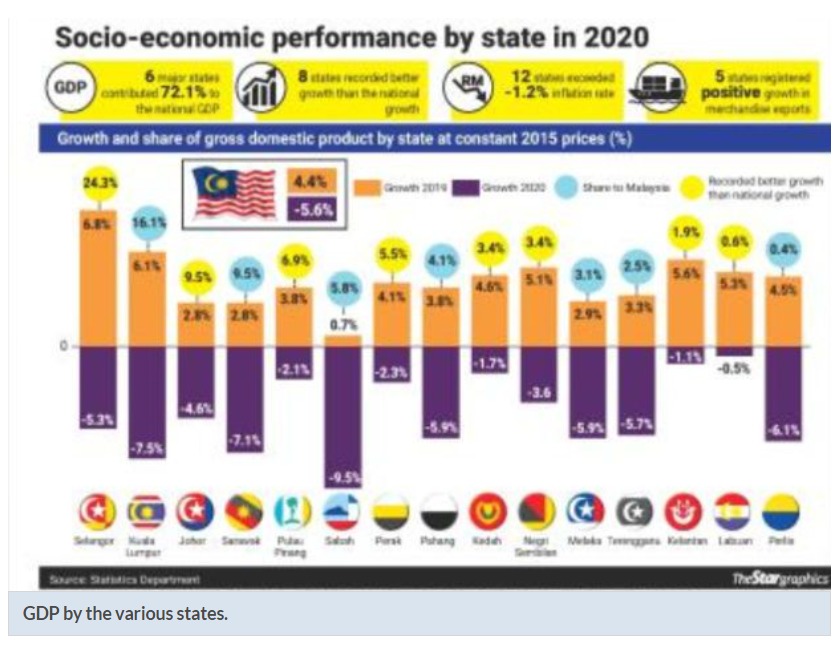Malaysia: Eight states do better than national GDP
KUALA LUMPUR: Malaysia’s socio-economic landscape was devastated in 2020, as every state in the country posted negative economic growth as a result of the Covid-19 outbreak, said the Statistics Department.
Nevertheless, eight states still managed to perform better than the 5.6% gross domestic product (GDP) contraction recorded at the national level.
These states are Labuan, which recorded a decrease of 0.5%, followed by Kelantan (-1.1%), Kedah (-1.7%), Penang (-2.1%), Perak (-2.3%), Negri Sembilan (-3.6%), Johor (-4.6%) and Selangor (-5.3%), the Statistics Department said in its State Socioeconomic Report 2020, released yesterday.
“Meanwhile, six states – Selangor, Kuala Lumpur, Johor, Sarawak, Penang and Sabah – remained the largest contributors to the national GDP with a total contribution of 72.1%.”
In a statement, chief statistician Datuk Seri Mohd Uzir Mahidin said the health crisis that hit the country following the outbreak of Covid-19 has left a profound impact on the country’s socio-economic landscape.
“Malaysia’s GDP contracted by 5.6% in 2020, which was the second lowest after the 1998 downturn of 7.4%. The implementation of various phases of the movement control order (MCO) and cross-state restrictions, as well as the closure of the international borders have hampered the country’s economic growth.
“Tourism-based industries such as accommodation, food and beverage and transportation activities were the most impacted by the MCO implementation.”
Uzir said the outbreak, which also plagued Malaysia’s major trading partners, had affected demand for goods and services, which in turn squeezed the country’s export performance.
“Meanwhile, the higher unemployment rate was partially influenced by the implementation of retrenchments by the affected business organisations to sustain their operations.
“The mean monthly salaries and wages received by employees in Malaysia also recorded a decline in 2020.”
Uzir said contagion containment measures had impacted salaries and wages when the mean monthly salaries and wages received by Malaysian citizen employees subdued to 9% from RM3,224 to RM2,933.
“It was reflected by the decline in all states in 2020, with Johor registering negative 13%, followed by Terengganu (-12.4%), Kuala Lumpur (-12.3%), Labuan (-11.5%), Sarawak (-11%) and Selangor (-10.6%).
“However, in terms of value, Putrajaya recorded the highest mean monthly salaries and wages with RM4,497. The other states that exceeded the national average (RM2,933) were Kuala Lumpur (RM3,823), Selangor (RM3,480), Negri Sembilan (RM3,013) and Labuan (RM2,942).”
Separately, Uzir said Malaysia’s total trade in 2020 decreased 3.6% to RM1.78 trillion as compared to RM1.84 trillion in 2019.
“Merchandise exports fell to 1.4%, influenced by a lower performance recorded in Sarawak (-19%), Selangor (-5.7%), Johor (-2.6%), Sabah (-14.8%), Kuala Lumpur (-9.8%), Terengganu (-16.7%) and Negri Sembilan (-10.7%).
“However, an increase in exports value was recorded in Penang with a growth of 10%, followed by Pahang (13.5%), Perak (6.9%), Melaka (1.7%) and Kelantan (1.7%).”
He said among the main products spearheading the increase in exports were electronic integrated circuits in Penang, iron and steel (Pahang), rubber gloves (Perak and Kelantan) and other electrical and electronic products (Melaka).
The State Socioeconomic Report is a comprehensive and exclusive publication for 13 states and two federal territories, which integrates economic and social demographic statistics.
The report also presents new information on trade statistics with a detailed performance of exports and imports by state.
Source: https://www.thestar.com.my/business/business-news/2021/08/06/eight-states-do-better-than-national-gdp


 Thailand
Thailand





